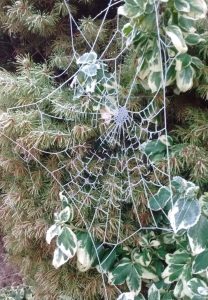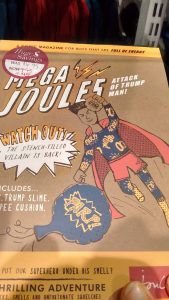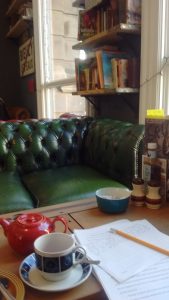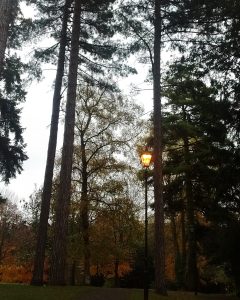This week’s bit of string: Moss loaves and leaf stew

As kids, my brother and sisters and I spent our days outside, fortifying dens to protect against unseen armies or searching for faeries. We often pretended Winter is Coming (I’m cross with Game of Thrones for purloining this premise), because the additional threat of nature made it more exciting. This necessitated hoarding of bread and fish: loaves of moss scraped from boulders, and bedraggled leaves caught from the stream.
Even now, the onset of cold and dreary weather gives me a thrill and causes me to particularly relish writing time. Am I alone in being inspired by winter?
Studying the Effects of Temperature on Creativity
There are many factors in the creative process. Research seems to prove that exposure to warm temperatures, even if it’s just holding a warm cup of coffee, inadvertently encourages people to treat each other more warmly, or at least to perceive each other as less emotionally cold. People are more inclined to notice relationships and connectedness when they are physically warm.
Given that conclusion, and my insistence that empathy is crucial to the writing process (and to life generally), these studies make it seem that cold weather might be bad for writing.
However, cold temperatures foster a different type of creativity. According to the same study as above, cold weather encourages metaphor recognition and originality of response. (The latter attribute was partly tested with a pasta-name-inventing exercise. How do they come up with these things?) So perhaps it’s actually a good time to be thinking of new story ideas, building new worlds, and incorporating symbols and meaning into our work.
Advantages of Winter Writing
Resourcefulness: Some of my most unique ideas come during cold months. A story featuring dolphins on Mars, for example, and my play A Night at the Armoured Cars Sub-Division, in which a secret government agency spies on people’s dreams to solve crime. Maybe we harbour an innate response to hazardous cold, an ability to consider options beyond the usual suspects. Isn’t that rather thrilling?

Fewer distractions: Sometimes I think, thank goodness it’s horrible out; I can just get on with my writing. Everything’s stripped bare, and that’s beautiful to me. The bleaker landscape makes shape and rare colour stand out, and that emerges, I believe, in my writing.
Structural integrity: Even if the drop in temperature renders it more difficult to fully appreciate the pulsing inner warmth of my characters, this could be a good opportunity to look at the mechanics of plot and retrace the structural foundations of a tale.
Creating our own heat: Further data shows that winter causes us to seek psychological warmth. People renting online movies choose romantic ones more often in wintertime. What better place to seek warmth than with our characters, preferably while huddled under a quilt and sipping some hot fruity tea?
I realise I’m lucky. I no longer live in part of the world that gets extreme weather. And in any part of the world, winter can have a terrible effect on some people, bringing depression which might dry up the very creative juices which could have sustained them. If that describes you, there are pages on the NHS website and on this useful Writing and Wellness site, which I hope might help. It’s not a problem to be taken lightly.
Taking the Weather With You
 As it turns out, both my completed novels use extreme weather as a backdrop during the pinnacle of the action. In The Wrong Ten Seconds, tensions escalate during a brutal heatwave in a small midlands city. In Artefacts, everything unravels as the New England temperatures plummet:
As it turns out, both my completed novels use extreme weather as a backdrop during the pinnacle of the action. In The Wrong Ten Seconds, tensions escalate during a brutal heatwave in a small midlands city. In Artefacts, everything unravels as the New England temperatures plummet:
“I love looking at you in this spooky snowstorm light.”
“It’s not really a storm.” Helen stared at the snow swirling around a streetlamp. Every now and then, a flake was caught in a gust, and blown upward against the bulb, brilliant as a firefly.
Selecting seasonal details to enhance characterisation and plot is another part of the fun.
Do you think winter affects your creative process? How much does it impact the characters in your stories?










